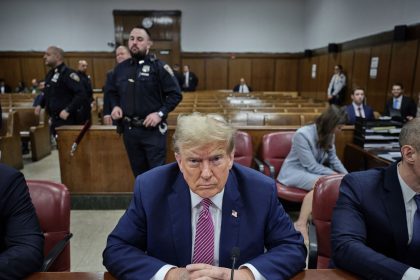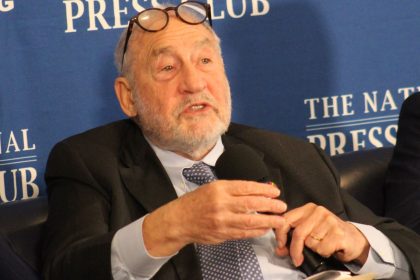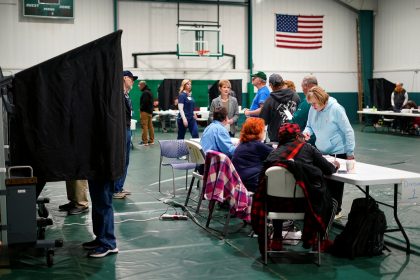Decline of Local Journalism is Likely Increasing Voter Polarization

WASHINGTON — In May 2017, former Republican Rep. Leonard Lance crossed party lines and voted against the GOP health care repeal, a proposal deeply unpopular with voters in New Jersey’s 7th District, which he had represented in Washington for nearly a decade.
A year later, Lance again joined Democrats to oppose the Republican tax cut bill. Although he supported portions of the bill and its overall intent, he decided to vote against it because it would hurt the ability of his wealthiest constituents to deduct the value of their state and local taxes.
Put simply, Lance was doing what a member of Congress is supposed to do: look out for the individual needs of the people who live in his district. Then he lost his reelection bid.
The 2018 election cycle was particularly brutal for moderate Republicans such as Lance who, despite efforts to distance themselves from the agenda and rhetoric of President Donald Trump, could not overcome their affiliation with the party he now leads.
“The results were based, I believe in large measure, on the president,” he said in a recent interview. “I would hope, moving forward, that voters could pick and choose based on the views of individual candidates.”
But that may be a pipe dream because voters — with fewer sources of local news and greater access to national media outlets and social media sites, whose algorithms focus on divisive national topics — are becoming more polarized. And though it’s partially a citizen’s duty to stay informed, the current situation isn’t entirely their fault — the decline of local newspapers, partisanship by national cable news outlets and a dangerous rise in online disinformation are all contributors to national polarization.
“This is going to result in people having a harder time finding information about their local elections,” says Kristy Roschke, managing director of the News Co/Lab at Arizona State University’s Cronkite School of Journalism, which tackles engagement and news literacy issues. “In the absence of clear information about local races, candidates, ballot initiatives, people turn to what they see, which is a never-ending stream of national politics on cable news.”
Going into the 2020 cycle, voters will have less information than ever before on the local races they’re going to decide. That means local candidates, and even people running for Congress, will face more questions on national issues, like the ongoing impeachment inquiry related to Trump’s Ukraine dealings, even if they’re hardly involved.
Serving in Congress these days “is defined by one thing: Do you support the president or don’t you? Do you support impeachment or don’t you?” former Rep. Ryan A. Costello, another moderate Republican who declined to run for reelection in 2018, said at a National Press Club event in August.
“We’ve really simplified, to the detriment of a well-informed citizenry, how we go about measuring our members of Congress,” Costello said.
With 60% of U.S. counties no longer benefiting from daily newspaper coverage, the negative side effects of the collapse of local media on American civic life are well-documented: Research has found that in places that have lost a newspaper, fewer people tend to run for mayor. Municipal costs increase. Voter turnout declines.
There are also fewer reporters around to cover the local member of Congress, and the members themselves have lost a crucial pipeline for communicating with their constituents.
House members, especially, “have always relied on the local news to get their messages out, to tell people what they’re doing in Congress,” says John Stanton, a journalist who, after being laid off by BuzzFeed in 2018, helped establish the Save Journalism Project, a nonprofit combating the decline in local news. “Without local news, it’s very hard for them to get that information out to people.”
The public trusts hometown news sources more than the national media, according to the Pew Research Center, which found in March that more than two-thirds of Americans think local reporters do a good job of holding politicians accountable. A year earlier, Pew found that only 21% of Americans have “a lot of trust” in national outlets, compared with 29% who have little or no trust in them.
Making matters worse, this year has been a particularly bad one for media professionals. By July, almost 3,000 people in the news business had been laid off or offered a buyout.
“As staffs have been reduced, those no longer on the staff on the newspaper tend to be those who know their local areas best and have a great institutional memory,” Lance said. “A generation ago, it was more likely that a local reporter with whom a public official was speaking had an institutional memory and too often that’s not currently the case.”
Caren Lissner, who along with several reporters was laid off from her job as editor-in-chief of the Hudson Reporter newspaper chain in northern New Jersey after it came under new ownership last year, says her staffers “knew what questions to ask.” The paper typically held candidate debates for local races in its offices and wrote up the results in that weekend’s edition.
“Now people get their information from paid mailers and campaign literature,” Lissner says, allowing politicians to “sidestep anything they want.”
The result, from the perspective of Lance and Stanton, is that a congressman’s individual deeds (or misdeeds) matter less than when local news thrived. Now, rank-and-file members are more likely to be defined by party affiliation and where they stand on cultural wedge issues prominent in national news coverage or, in the likely case of 2020, the impeachment of Trump.
In 2016, for the first time in a century, not one state elected a senator from a different party than the one the state’s voters supported in the presidential election, according to research published last year by the Journal of Communication. That compares with 1992, when 37% of states did.
That research, compiled by Joshua Darr of Louisiana State University, Matthew Hitt of Colorado State University and Johanna Dunaway of Texas A&M University, also found that split-ticket voting had decreased almost 2% in communities where the local newspaper had shut down.
The result, according to former Democratic Rep. Jim Moran, who represented a Northern Virginia district from 1991 to 2015, is that “the most liberal Republican is more conservative than the most conservative Democrat now, and every year the gulf widens.”
Now, “elections are nationalized on cultural issues,” Moran said, seated beside Costello at the Press Club in August. “Most members spent their time serving their district and they were almost invulnerable as long as they looked out for their district. Now they can get defeated on one cultural issue.”
According to the research by Darr, Hitt and Dunaway, without dependable local newspapers covering local issues, voters turn to national outlets, especially cable television networks, in order to get their news. This leads to increased polarization for two reasons.
“First, national news outlets primarily cover national politicians, elections and issues, and national elites are deeply polarized along partisan lines,” they wrote. “Second, national news media — particularly broadcast television and cable news outlets — are prone to cover the most contentious aspects of national party politics.”
Costello said this affects how members of Congress act when they’re in Washington: The more polarized the news coverage, the more polarized the voters, the more polarized the politicians.
“The cottage industry of ideological left and right news sites and their ability to influence readers who arguably want to be informed, but seek to be informed with the predispositions that they already have, is a really difficult thing to overcome,” he said. “What drives congressional attitudes and behaviors and responses is where their constituents are getting their news.”
———
©2019 CQ-Roll Call, Inc., All Rights Reserved
Visit CQ Roll Call at www.rollcall.com
Distributed by Tribune Content Agency, LLC.
























